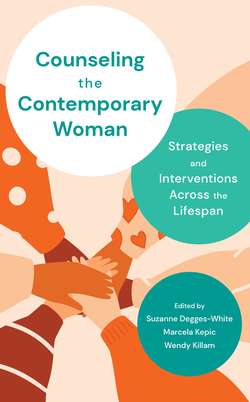Читать книгу Counseling the Contemporary Woman - Suzanne Degges-White - Страница 35
На сайте Литреса книга снята с продажи.
Integrating Relational-Cultural Therapy into Counseling Practice
ОглавлениеKatherine M. Hermann-Turner
“Intimate relationships are the conduit to the development of the sense of self.” (Frey, 2013, p. 178)
In 1976, Jean Baker Miller published Toward a New Psychology of Women, which elaborated on feminist principles and set the foundation for what would eventually become relational-cultural therapy (RCT). Fueled by these writings and the pathologization of typical female characteristics (i.e., empathy and the desire for connection to others being considered needy, dependent, or overly emotional), Miller along with Irene Stiver, head of the Department of Psychology at McLean Hospital, and Janet Surrey and Judith Jordan, psychologists at McLean, began having bimonthly meetings (Jordan, 2017). During these Monday meetings, the women discussed deficiencies they observed in traditional clinical theories, reflected on their female clients’ unique concerns, and explored the effects of patriarchal influences. Through this dialogue, Miller, Stiver, Surrey, and Jordan recognized the value of traditional female characteristics and identified relationships as a source of connection and growth for their clients, beliefs disregarded by traditional theories.
The meetings of these four women eventually led to the creation of the Jean Baker Miller Training Institute at Wellesley College, hundreds of working documents on RCT, a biennial conference, and most importantly energy around and interest in the importance of relationships (Jordan, 2017). They challenged the egocentric foundation of many existing theories. Relationship, connection, and collective growth were embraced, and practitioners and theorist alike began to acknowledge that humans may not grow in isolation. These women and their writings opened the doors for the exploration of growth through connections. These writings have continued to welcome and integrate the voices of people of color and all sexual orientations (Duffey & Somody, 2011; Frey, 2013). The ideas of RCT are not static but rather continue to flex to adapt to different cultures and individual perspectives.
